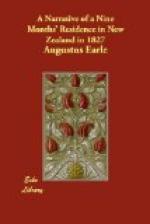I frequently conversed with George upon the subject of religion, and from what he told me I found that the natives had not formed the slightest idea of there being a state of future punishment. They refuse to believe that the good Spirit intends to make them miserable after their decease. They imagine all the actions of this life are punished here, and that every one when dead, good or bad, bondsman or free, is assembled on an island situated near the North Cape, where both the necessaries and comforts of life will be found in the greatest abundance, and all will enjoy a state of uninterrupted happiness. A people of their simple habits, and possessing so little property, have but few temptations to excesses of any kind, excepting the cruelties practised by them in war, in which they fancy themselves perfectly justified, and the tyranny exercised by them over their slaves, whom they look upon as mere machines. There is, in fact, but little crime among them, for which reason they cannot imagine any man wicked enough to deserve eternal punishment. This opinion of theirs we saw an illustration of one Sunday, when one of the missionaries paid us a visit.
The ceremony of all assembling to public worship astonished the natives greatly, though they always behaved with the utmost decorum when admitted into the house where the ceremony takes place. On the day in question the minister endeavoured to explain the sacred mysteries of our religion to a number of the chiefs who were present. They listened attentively to all he said, and expressed no doubts as to its truth, only remarking that “as all these wonderful circumstances happened only in the country of the white men, the great Spirit expected the white men only to believe them.” The missionary then began to expatiate on the torments of hell, at which some of them seemed horrified, but others said “they were quite sure such a place could only be made for the white faces, for they had no men half wicked enough in New Zealand to be sent there;” but when the reverend gentleman added with vehemence that “all men” would be condemned, the savages all burst into a loud laugh, declaring “they would have nothing to do with a God who delighted in such cruelties; and then (as a matter of right) hoped the missionary would give them each a blanket for having taken the trouble of listening to him so patiently.”
I cannot forbear censuring the missionaries, inasmuch as they prevent the natives, by every means in their power, from acquiring the English language. They make a point of mastering the native tongue as quickly as possible, and being able to give their whole time and attention to it, this is easily accomplished. It is of importance that they should do so, otherwise they could not carry on the duties of the mission; but by thus engrossing the knowledge, they obtain great influence over the minds of the natives. We ourselves were sadly puzzled by a correspondence we had with two native chiefs, who had been taught to read and write by some of the Society; but their acquirements being in their native language, were of no possible use. The difficulty of teaching them English would not have been greater, and then what stores of information and improvement might not their instructors have laid open to them.




